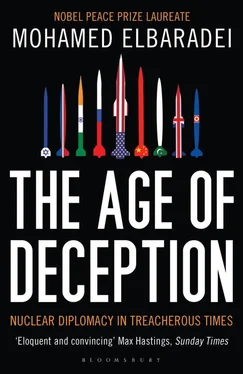Could another Saddam Hussein be out there, undetected, busily at work on clandestine nukes? The answer is that, for those countries that have not accepted the Additional Protocol, we really don’t know.
Throughout the mid-1990s, the IAEA and UNSCOM continued their work in Iraq. All weapons-usable nuclear material was shipped out of the country, and all other nuclear material—roughly five hundred tons of natural uranium in various forms, and nearly two tons of low-enriched uranium dioxide—was verified to be under IAEA control. Similar steps were taken with biological and chemical weapons stocks.
By October 1997, the IAEA had completed a series of thirty major inspection campaigns in Iraq. Roughly five hundred site inspections had been completed, involving more than five thousand person days of inspector time. IAEA inspectors had supervised the destruction of more than fifty thousand square meters of nuclear facilities, approximately two thousand fuel cycle or weapons-related items, and more than six hundred metric tons of special alloys. As an example, the facilities at Al-Atheer, designed for nuclear weapons development, testing, and production, had been destroyed by explosive demolition under IAEA and UNSCOM supervision. All uranium enrichment equipment and facilities had been dismantled.
Gradually, as the work mandated under Resolution 687 was completed, the focus of both agencies had shifted away from dismantlement of equipment and removal of material and toward monitoring and verification. The IAEA’s task of eliminating Iraq’s nuclear program under Resolution 687 was essentially complete. But the Americans, acting through the State Department and other parts of the administration, urged the IAEA not to report this conclusion to the Security Council. They wanted the pressure on Saddam Hussein to continue unabated.
To this end, the United States suggested that the IAEA should wait to report the completion of its work until UNSCOM could do the same. Of course there was no logic to this—as Blix argued in his discussions with the United States. He said they should think of UNSCOM and the IAEA as two horses running, and that there was nothing wrong with one reaching the finish line before the other.
Blix made his final report to the Security Council as the outgoing Director General in October 1997. He felt that since he was leaving, he would have an easier time resisting pressure from the United States, and he reported to the council that the IAEA had pretty much completed the “disarmament phase” in Iraq and had moved to the next phase. The report stated that the Agency was now dedicating most of its resources in Iraq to “ongoing monitoring and verification,” with only a few minor disarmament issues remaining.
The UNSCOM situation was considerably more complicated. From the outset of the Iraq inspections, the IAEA and UNSCOM had diverged sharply in both their composition and their styles of inspection. But a more disturbing difference emerged later in the 1990s. The Iraqis charged that UNSCOM was a de facto spy agency of U.S. and Israeli intelligence, trying to collect information outside its mandate—in effect, using WMD disarmament as a cloak under which to gather and pass along information regarding conventional weaponry and military capabilities, which Western governments could then use to develop military targets.
These charges from Baghdad intensified after Richard Butler, an experienced arms control diplomat from the Australian Foreign Service, took over from Rolf Ekeus as director of UNSCOM in 1997. Butler, Scott Ritter, one of the chief inspectors, and other UNSCOM officials were specifically accused by the Iraqis of cooperating with the CIA to spy on Saddam Hussein’s military apparatus. Not only were accusations coming from Iraq, but Butler and Ritter themselves began to take potshots at each other.
Two years later, both the Washington Post and the Boston Globe wrote that members of UNSCOM had cooperated with a U.S. electronic eavesdropping operation that allowed intelligence agents to monitor military communications in Iraq. [23] Barton Gellman, “U.S. Spied on Iraq Via U.N.,” Washington Post , March 2, 1999. A similar story appeared in the Boston Globe.
And Scott Ritter himself admitted how much UNSCOM was being manipulated. [24] Ritter would later become known for his criticism of U.S. foreign policy. In March 2003, he would argue publicly that Iraq possessed no significant WMDs.
In 2002, in an interview with Fox News, he said:
Richard Butler allowed the United States to use the United Nations weapons-inspection process as a Trojan horse to insert intelligence capabilities into Iraq, which were not approved by the United Nations and which did not facilitate the disarmament process, but were instead focused on the security of Saddam Hussein and military targets…. Richard Butler facilitated American espionage in Iraq. Richard Butler facilitated American manipulation of the inspection process…. On four occasions, from March 1998 until my resignation in August 1998, I wrote Richard Butler a memorandum saying, “Boss, if you continue down this path you are facilitating espionage. This is not what we’re about and you can’t let this happen.” He received this memorandum and disregarded my warning and ultimately, in the end, let’s ask ourselves why the inspectors aren’t in Iraq today.
Butler strongly denied these accusations, saying that Ritter’s claim “that I sold the store to the CIA is dramatically untrue.” Butler said he had actually scaled back on the degree to which UNSCOM used intelligence, because of concerns about reputation and the need to protect “the independence of multilateral disarmament activities.” He admitted that UNSCOM members had, on occasion, reported back to their home governments, but he categorically denied that UNSCOM had been dominated by the United States, calling Ritter’s charges “quintessentially ludicrous.” [25] “The Lessons and Legacy of UNSCOM: An Interview with Ambassador Richard Butler,” Arms Control Today 29, no. 4 (June 1999).
What seems clear is that Butler had very decided preconceptions about Iraq and about the intentions of Saddam Hussein’s government. Before Rolf Ekeus left his post in 1997 as the first director of UNSCOM, he had reported that most of the UNSCOM mandate—as it related to disarming Iraq of its chemical and biological weapons—was near completion. [26] S/1997/301, report by the executive chairman of UNSCOM, April 11, 1997. In his conclusions to this report, Ekeus wrote, “The accumulated effect of the work that has been accomplished over six years since the ceasefire went into effect, between Iraq and the Coalition, is such that not much is unknown about Iraq’s retained proscribed weapons capabilities.” Ekeus wrote further that the efforts from October 1996 to early 1997 were focused on getting the “major outstanding issues to a manageable quantity” and cited overall satisfaction with missile and chemical weapons issues. He noted that Iraq’s presentation in the biological weapons area remained “rather chaotic.”
Richard Butler disagreed. He routinely insisted that Iraq had undisclosed WMDs. His report to the Security Council on December 15, 1998, presented a harsh picture of Iraq’s lack of cooperation. It was perceived by many as imbalanced and unfair.
Butler’s report became the justification for the 1998 U.S. bombing campaign known as Operation Desert Fox. Notably, the United States suggested that UNSCOM withdraw its inspectors, for safety considerations, on the very same day that Butler delivered his report—a not-so-subtle indication that the United States knew what it contained. [27] In Butler’s book Saddam Defiant: The Threat of Weapons of Mass Destruction, and the Crisis of Global Security (New York: Weidenfeld and Nicolson, 2000), he says it was U.S. ambassador Peter Burleigh, acting on instructions from Washington, who suggested that Butler pull the UNSCOM team from Iraq in order to protect them from the forthcoming U.S. and British air strikes (p. 224).
Butler gave his order to withdraw the UNSCOM inspectors on December 15, at midnight New York time. By the time the diplomats woke up in the morning, the withdrawal of the inspectors was a fait accompli.
Читать дальше












